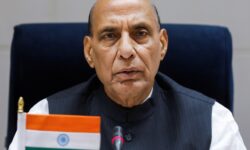
A landmark EU decision this week to send Ukraine the interest earned by hundreds of billions of dollars in Russian central bank accounts on its territory is adding urgency to a debate over what will happen to those accounts.
The difference between the two sums is enormous.
Ukraine wants to use the estimated 210 billion euros ($228bn) of Russian central bank money held in European institutions to defeat Russia on the battlefield. The EU froze those assets in February 2022, immediately after Russia invaded Ukraine. Another 50 billion euros ($54bn) are frozen around the world.
“If the world has $300bn, why not use it?” Ukrainian President Volodymyr Zelenskyy recently said.
After years of debate, the bloc decided on Tuesday to allow Ukraine to use just the interest earned by those accounts, which the EU believes would amount to about 2.5 to 3 billion euros ($2.7bn-$3.3bn) a year.
“This decision was the result of a lot of discussion and soul-searching,” an EU diplomatic source familiar with Ukrainian issues told Al Jazeera on condition of anonymity.
International legal experts agree it is a big step.
“There’s no precedent for the freezing of assets on this scale, and therefore the issue of what to do with the interest was never this acute,” Anton Moiseienko, a lecturer in international law at Australian National University, told Al Jazeera. “In this sense, new ground is being broken.”

The EU decision is to tap the interest twice a year and send it to Ukraine in the form of cash and weapons.
This money is over and above weapons EU members have already contributed, or plan to contribute through bilateral agreements, European Commission sources told Al Jazeera.
It is also separate from the 12.5 billion euros ($13.6bn) a year in financial assistance they have pledged for the next four years.
A first payment is to be made in July, representing interest earned since February, when the EU ordered financial institutions to separate profits from the principal.
The institutions will keep any interest earned between February 2022 and February 2024, possibly for reconstruction purposes, European Commission sources said.
But what about the rest?
“Right now it doesn’t seem as though the EU is in any way prepared to move on to a discussion about using the principal for Ukraine,” the diplomatic source said. “There are European institutions that are against it and a lot of member states that are against it. The EU doesn’t want to risk its reputation and its prosperity.”
The European Central Bank has been especially vocal about leaving other central banks’ assets alone, worried about reputational damage to the euro. And some EU members like Hungary and Slovakia maintain strong economic ties with Russia and have made known their unease about alienating Moscow.
That leaves matters on a plateau, said Moiseienko.
“It is a placeholder, an intermediate step. But a placeholder for what?” Moiseienko said. “Transfer of those assets to Ukraine, or continue in this wait-and-see game? In terms of the overall direction of travel, it’s very unclear.”
“The EU keeps saying that Russia must pay but keeps taking steps that prevent that from happening,” he added.
The EU could be testing the waters for international reactions to its first move.
Philippa Webb, a professor of international law at King’s College London, said that Russia had a clear obligation under the law to pay Ukraine reparations for launching an aggressive war against it, but it also enjoyed immunity from most forms of enforcement.
But that immunity was not absolute, she advised the European Parliament in a research paper last February. It is just a question of finding the right legal avenue to seizing the entire principal – something that would break new legal ground.
Over the past two years, several ideas have been presented.
One approach is to issue a loan using the Russian assets as collateral, but it would amount to much less than the assets.
Another is to use a legal concept known as countermeasures, whereby a country takes a step normally considered unlawful, such as seizing sovereign assets, but is justified as a response to a previous unlawful action by the other state.
In this case, Russia’s unlawful act was to wage a war of aggression, against the statutes of the United Nations Charter and its recognition of Ukraine’s borders in 1991.
More ambitiously, the United Nations could vote to lift Russia’s immunity from enforcement, creating a new international legal standard. That would require a large majority in the General Assembly, legal experts believe.
Shortly after Russia’s invasion of Ukraine, 141 out of 193 UNGA members demanded a Russian withdrawal, marking a high point of empathy with Ukraine.
As Al Jazeera has reported, Ukraine has been unable to recreate that majority to indict Russian President Vladimir Putin for the crime of aggression, and it is unlikely the world would show a greater appetite for remaking international law to seize Russian assets.
The EU has invited Ukraine to become a future member, and therefore assumes the greatest responsibility for its reconstruction, pointed out political scientist Theodoros Tsikas.
Unwillingness or inability to harness an aggressor’s assets would not only be perceived as weakness – it would not match up to the EU’s claim to uphold the rule of law, he said.
“The reconstruction of Ukraine and the healing of its wounds is seen as a key task for the EU,” he told Al Jazeera. “Like all aggressors, Russia will have to pay war reparations to Ukraine,” Tsikas said.
How that happens without global enthusiasm is now the subject of an intensifying debate.
EMEA Tribune is not involved in this news article, it is taken from our partners and or from the News Agencies. Copyright and Credit go to the News Agencies, email news@emeatribune.com Follow our WhatsApp verified Channel









